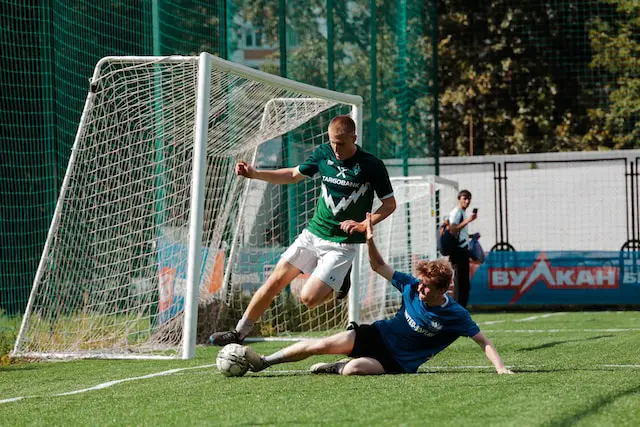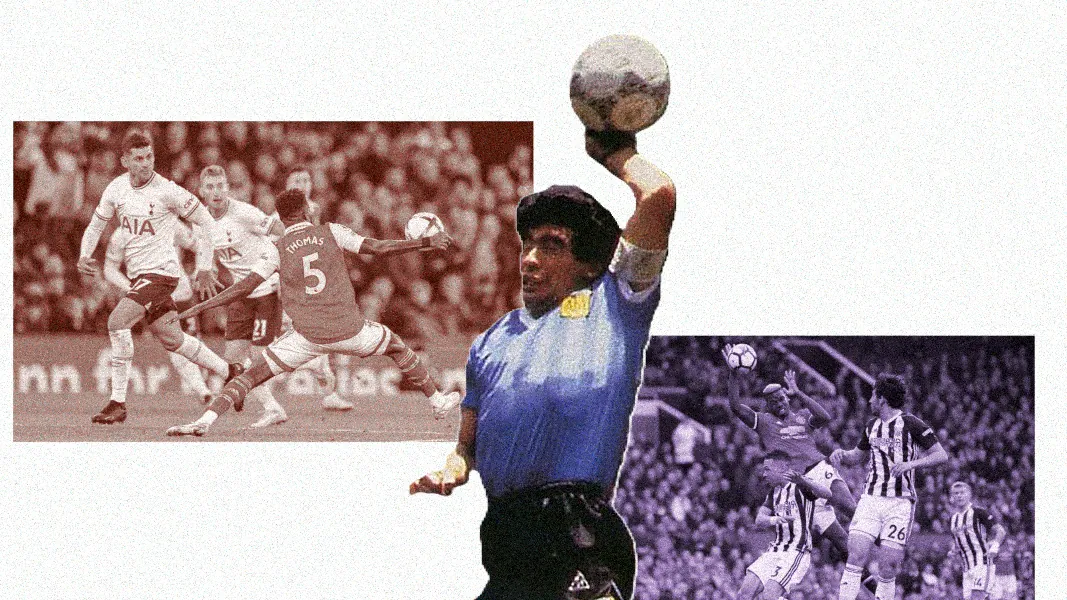Welcome to our beginner’s guide on how to slide tackle in soccer! If you’re looking to master this essential defensive technique, you’ve come to the right place.
In this article, we’ll break down the steps and strategies behind a successful slide tackle soccer move. Whether you’re a novice player eager to learn the basics or a seasoned enthusiast aiming to refine your skills, understanding how to slide tackle soccer style can make a significant difference on the field.
What is a Slide Tackle in Soccer?
The slide tackle is a fundamental move in soccer that every player should grasp. It’s all about timing and technique, allowing you to cleanly win the ball from your opponent while maintaining control and avoiding fouls.
A slide tackle involves sliding on the ground to intercept the ball from an opponent’s possession. It’s a skillful method to regain control and shift the momentum of the game in your team’s favor. When executed correctly, it can be a game-changer.
Differentiating Legal and Risky Tackles
Understanding the difference between a well-executed slide tackle and a reckless challenge is vital. A legal slide tackle aims to cleanly touch the ball while avoiding the opponent. On the other hand, a risky tackle can result in a foul or even a penalty, potentially putting your team at a disadvantage.
Benefits of Mastering the Slide Tackle
Mastery of the slide tackle can transform you into a defensive powerhouse. It allows you to swiftly break up an opponent’s attack, regain possession, and transition smoothly to offensive play. By mastering this technique, you become a formidable asset to your team’s overall strategy.
Preparing for a Slide Tackle
Effective slide tackling requires more than just physical prowess – it’s a combination of mental readiness and proper positioning. Before you launch into a slide tackle, it’s essential to be well-prepared.
1. Positioning and Anticipation
Positioning yourself correctly is the first step towards a successful slide tackle. Anticipate the movement of the opponent and position your body accordingly. Your aim is to be in the best possible spot to intercept the ball without endangering yourself or your opponent.
2. Timing is Everything
The art of timing plays a significant role in slide tackling. Gauge the right moment to initiate the tackle – a split second too early or too late can make all the difference. Patience and observation are key. Wait for the precise instant when you can make a clean and effective tackle.
3. Mental and Physical Readiness
Being mentally focused and physically primed are vital components of slide tackling. Mentally commit to the tackle, but stay composed – rash decisions can lead to mistakes. Physically, ensure you’re in a balanced stance, ready to explode into the slide when the opportunity arises.
4. Communicating with Teammates
Slide tackles often involve teamwork, especially in scenarios where you’re covering a teammate or executing a coordinated defensive strategy. Communicate effectively with your fellow players to avoid confusion and ensure everyone is on the same page.
Fundamental Techniques of a Slide Tackle
1. Body Positioning and Balance
Maintaining the right body position and balance is key to a successful slide tackle. Keep your body low and your weight evenly distributed to prevent losing control during the tackle. This balanced stance gives you stability and agility to move quickly.
2. Approach and Timing
Approach the opponent with calculated steps, adjusting your pace to match theirs. As you get closer, focus on the timing – choose the exact moment to slide in and make contact with the ball. Timing is the linchpin of a well-executed slide tackle.
3. Sliding Motion
When you initiate the slide, ensure that your leading leg is extended, and your trailing leg is bent to generate a controlled slide. Use your leading leg to guide your slide towards the ball while maintaining stability with the other leg.
Remember, the primary objective of a slide tackle is to cleanly touch the ball without endangering your opponent. Your technique should prioritize ball retrieval over tackling the player.
Executing the Slide Tackle
1. Contact Point and Technique
The point of contact matters greatly. Aim to make contact with the ball, not the opponent. Use the inside or outside of your foot to execute the tackle. The goal is to disrupt the opponent’s control of the ball and regain possession for your team.
2. Ball Retrieval
After the tackle, it’s crucial to recover quickly and regain possession of the ball. Use your momentum to bounce back onto your feet, ready to transition into offensive or defensive play, depending on the situation.
Advanced Slide Tackling Techniques
As you become more adept at slide tackling, you can expand your skills with advanced techniques that can make you an even more formidable defender on the soccer field.
1. Block Slide Tackle
Block tackles involve using the slide to block an opponent’s shot or pass. It requires precise timing and positioning to intercept the ball while minimizing the risk of fouling. By mastering block tackles, you can thwart scoring opportunities and swiftly transition to counterattacks.
2. Interception Slide Tackle
Interception tackles focus on reading the game and anticipating your opponent’s next move. Instead of waiting for the ball to come to you, you proactively slide in to intercept passes or crosses. This technique requires a keen understanding of your opponent’s intentions and quick decision-making.
3. Recovery Slide Tackle
Recovery tackles are your last line of defense when you’ve been caught out of position. Executed as a desperate measure, these tackles involve sliding in to regain possession after a potential breakaway or threatening attack. Proper timing and technique are crucial to avoid conceding penalties or dangerous situations.
Common Mistakes to Avoid When Making a Slide Tackle

While slide tackling can be a game-changing skill, it’s important to be aware of common mistakes that can lead to fouls, injuries, or missed opportunities.
1. Overcommitting
One of the most common mistakes is overcommitting to a slide tackle. Charging in too aggressively can leave your defense vulnerable and open up space for opponents to exploit. Maintain control and choose your moments wisely.
2. Improper Sliding Technique
Using the wrong sliding technique can result in fouls or injuries. Always prioritize making contact with the ball rather than the opponent. Avoid lunging or extending your leg recklessly, which can lead to dangerous challenges.
3. Failing to Assess Timing
Timing is everything in slide tackling. Mistiming your tackle can result in missed opportunities or, worse, fouls. Patience and observation are key – wait for the optimal moment to initiate the slide.
4. Neglecting Defensive Cover
Slide tackling should be a calculated decision, not a lone endeavor. Failing to communicate and coordinate with your teammates can create gaps in your defense. Ensure you have defensive cover to minimize risks.
5. Losing Focus
Mental lapses can lead to mistimed tackles or poor decision-making. Stay focused on the game, the ball, and your opponents. Avoid distractions that could compromise your ability to execute a successful slide tackle.
6. Ignoring Referee Signals
Being unaware of the game’s context or disregarding referee signals can lead to unnecessary fouls or penalties. Pay attention to the flow of the game and respond accordingly, respecting the referee’s decisions.
FAQs About Making a Slide Tackle
To slide tackle without fouling, focus on making clean contact with the ball rather than the opponent. Time your tackle accurately, ensuring you reach the ball before the opponent does. Maintain control of your sliding motion and avoid using excessive force or endangering the opponent.
It’s best to slide tackle when the opponent’s control of the ball is vulnerable and you can retrieve it without causing harm. Avoid sliding in from behind or when your momentum could lead to a dangerous challenge.
Executing a powerful slide tackle requires a combination of speed, timing, and technique. Approach the ball decisively, making contact with the inside or outside of your foot. Maintain a low and balanced stance to generate force while sliding. Focus on the ball and aim to cleanly dispossess your opponent.
Slide tackling may cause some discomfort, especially if not executed correctly. Proper technique and protective gear, such as shin guards, can help minimize the impact and reduce the risk of injury.
It’s generally introduced at older youth levels, often around ages 12 to 14, once players have developed a good understanding of the game, technique, and fair play.
Yes, slide tackling from behind is often considered a dangerous play and can result in a foul.
Yes, girls can slide tackle in high school soccer, just like boys. The rules and regulations regarding slide tackling are typically the same for both genders.
Final Thoughts on How To Slide Tackle in Soccer
In soccer, mastering the slide tackle is a valuable asset that can make you a standout defender and a crucial contributor to your team’s success. With the right techniques and a clear understanding of the fundamentals, you can execute slide tackles confidently and effectively.
To slide tackle in soccer:
- Position Yourself: Anticipate your opponent’s movement and position yourself correctly for the tackle.
- Time it Right: Choose the perfect moment to initiate the slide, ensuring you reach the ball cleanly.
- Use Proper Technique: Maintain balance and use the right sliding motion to make controlled contact with the ball.
- Focus on the Ball: Prioritize winning the ball while avoiding the opponent and dangerous challenges.
- Recover Swiftly: After the tackle, bounce back onto your feet quickly to regain possession or transition play.
As you continue to refine your slide tackling abilities, you’ll become a true soccer maverick – a player who can read the game, anticipate opponents’ moves, and execute slide tackles with precision.











